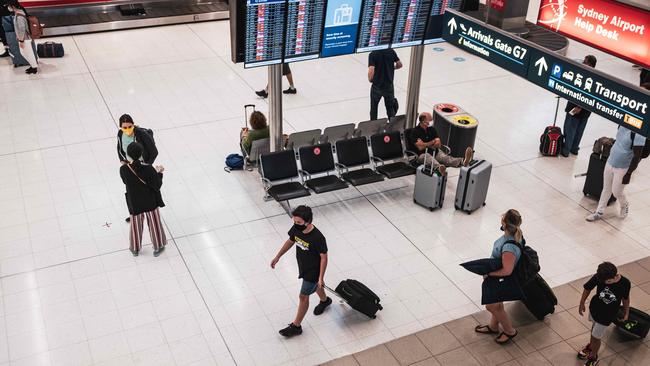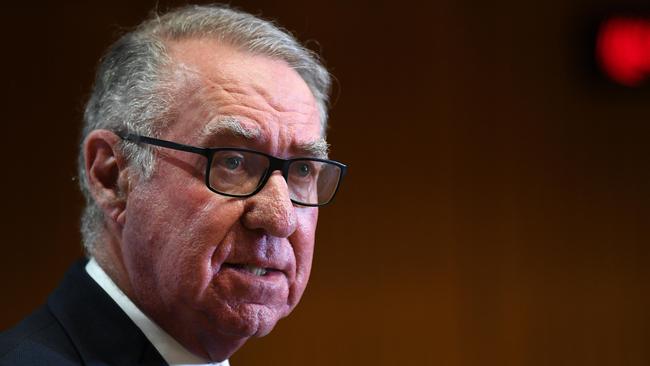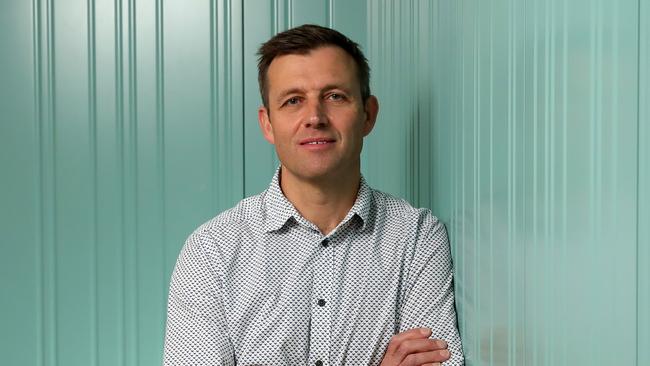
David Gonski and his Sydney Airport board are firmly in that camp, but it is not a given and just maybe the airport has reached peak valuation.
Gonski has told IFM boss David Neal his $8.25 a share is not enough and the company is worth more than the $29.8bn enterprise value he has offered.
Sydney Airport’s stock price peaked in December 2019 at $8.87 and since then the airport has issued 438 million shares at $4.56 in August last year.
This means it is misleading to use the peak near $9 as a high and in fact on an adjusted basis IFM is close to the previous high at more like $8.30.
Net debt today is $7.5bn, but was $9.5bn prior to the equity raising, which means arguably the bid pre-equity issue is more like $8.99.
Maybe, but the fact is Gonski has said no and if Neal wants to get into the game he has to lift his bid to closer to $9, end of story.
Gonski and IFM are acting on the assumption the bidder never puts the best bid on the table first up and the board doesn’t take the first bid as gospel.

Shareholders view the action as entirely predictable so no backlash looms any time soon.
Now the war of words begins until IFM comes back with a higher price.
Over the last five years the stock has underperformed the market on total shareholder returns by 40 per cent, but has outperformed by 183 per cent over 10 years.
Ten years ago the stock was trading below $3 and nearly 20 years ago Macquarie dumbfounded the market when it paid $5.6bn to the feds to take control of the airport.
The asset has appreciated 5.4 times since Macquarie was proved right on its early valuation, but the issue now is whether Covid has changed the world.
Big business says hybrid working is here to stay, which means fewer people will commute to the city five days a week, which if correct could fundamentally change inner cities. Big business pays rent so it’s in its interest to talk down the market.

Sydney Airport will face a different world at least until 2024, when IATA is tipping global aviation will return to normal.
It has competition of sorts with western Sydney to cater for the budget airline market.
Chinese-based travel will be minimal for the foreseeable future while the federal government does its best to trash relations with the region’s biggest economy.
IATA says not to expect international travel to get back to any normality before 2024, which is three years away and the time factor is weighing on valuations.
All this suggests the airport, while strategically important, is maybe not quite as valuable as Gonski thinks. This means he may not get the $9-a-share proposal he may want, before granting due diligence.
The board has to realise Covid is not just a passing phase, it is happening, is real and must have some downward impact on airport valuations. Just how much will be revealed soon, when IFM inevitably comes back to the table.
-
Stokes talks peace
Ryan Stokes has come out waving the peace flag after winning absolute control of Boral on Thursday, promising to maintain a board with a majority of independent directors.
Stokes is expected to replace Kathryn Fagg as chair and Richard Richards will be reinstalled on the board.
From there it is a question of who Stokes regards as independent.
The board has issued a statement advising shareholders to reject the offer, which at $7.40 a share is at the bottom end of the independent expert’s range that runs over $9.
Stokes now has 52.7 per cent of Boral, which will trigger an automatic two-week extension in his $7.40-a-share offer for the company.
In a statement, Stokes said technically he only had 49.3 per cent because he owns 3.3 per cent through an equity swap with Macquarie.
The bid is expected to get through the 50 per cent mark overriding the technicality, but ASIC would surely have imposed its own rule if that didn’t happen.
The extension is aimed at giving minority shareholders the chance to accept the bid now control has passed.
Stokes’s holding of the equity swap has exposed another loophole in the takeover law because the swap could be cash-settled, which means he doesn’t actually own the stake that would take him over 50 per cent.
This should be clarified because the intent is clear.
In the next few weeks Josh Frydenberg will circulate a law reform proposal to give the Takeovers Panel more control over schemes of arrangement to simplify the rules and remove unnecessary court intrusions.
There is a clear case now in the wake of Boral’s demise as an independent company for the inclusion of a proposal to impose a requirement that all bids have a 50 per cent minimum acceptance condition.
While the Treasurer is at it, it would also make sense to re-examine the case for the 3 per cent creep exemption, which is potentially a threat to minority shareholders.
A 75-year-old icon has fallen in part because of a weak board but also because Stokes has exploited loopholes in the law and, if Frydenberg wants to protect shareholder rights, he will move quickly to plug the holes.
The Australian Law Reform is undertaking a major review of company regulation with the first paper due in November followed by another in September next year and a final report in August 2023.
It is looking at a makeover in the wake of the 2019 royal commission – the measures cited here are to plug obvious gaps that leave shareholders unwitting victims.
-
Payments update
The ACCC will hand down its decision on the payments merger between Eftpos, BPay and the National Payments Platform on Friday week and on Thursday it released some updates from the RBA.
It argued: “Consolidation of the three schemes would be likely to result in a stronger Eftpos that would be able to compete more effectively against the two international debit schemes. We expect that a consolidated entity would be better able to deal with co-ordination issues.”
The RBA noted all three platforms had difficulty in attracting industry support.
It said: “Eftpos in particular would benefit from more strategic decision-making involving more senior bank representatives who have greater ability to support Eftpos initiatives within their own organisations.”
The RBA said it was “already proposing a number of measures to safeguard competition in the debit card market and there would be a number of additional regulatory responses that the bank could consider in the event that there was some reduction in competition, including due to a weakening in Eftpos’s position”.
The “initiatives (would) further improve the transparency of payment costs for merchants, to help reduce some impediments to competition in the acquiring market for smaller merchants”.
The point is the RBA acknowledged there were impediments.






The battle for Sydney Airport is a test on whether shareholders believe the world in three years time will be the same as it was pre-Covid.